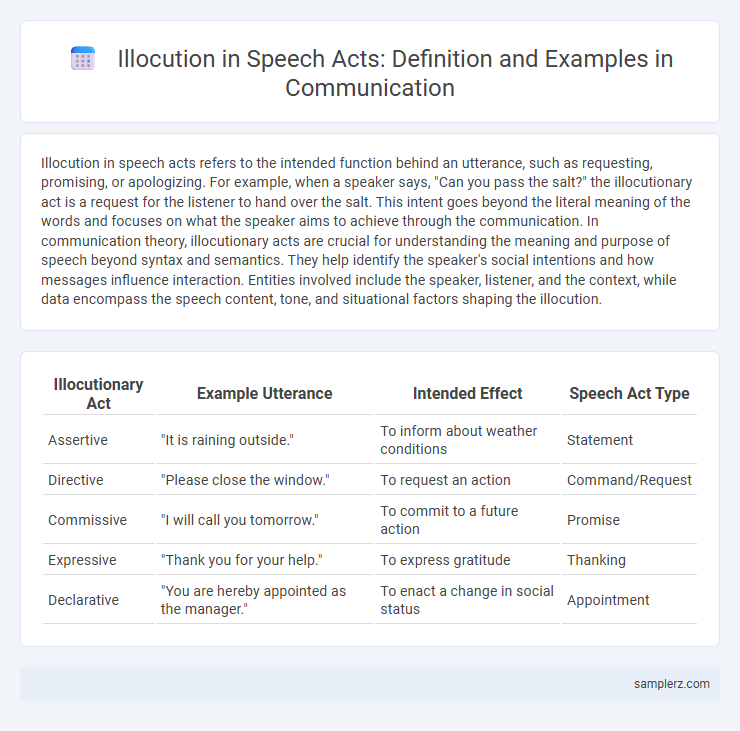Illocution in speech acts refers to the intended function behind an utterance, such as requesting, promising, or apologizing. For example, when a speaker says, "Can you pass the salt?" the illocutionary act is a request for the listener to hand over the salt. This intent goes beyond the literal meaning of the words and focuses on what the speaker aims to achieve through the communication. In communication theory, illocutionary acts are crucial for understanding the meaning and purpose of speech beyond syntax and semantics. They help identify the speaker's social intentions and how messages influence interaction. Entities involved include the speaker, listener, and the context, while data encompass the speech content, tone, and situational factors shaping the illocution.
Table of Comparison
| Illocutionary Act | Example Utterance | Intent | Context |
|---|---|---|---|
| Assertive | "The meeting starts at 9 AM." | To inform or state a fact | Providing information in a workplace |
| Directive | "Please close the window." | To request or command | Asking someone to take an action |
| Commissive | "I will send the report by tomorrow." | To promise or commit | Making a formal commitment |
| Expressive | "Thank you for your help." | To express gratitude | Responding to assistance |
| Declarative | "You are fired." | To effect change in status or condition | Delivering a formal decision |
Understanding Illocutionary Acts in Communication
Illocutionary acts in communication involve the speaker's intention behind an utterance, such as asserting, questioning, commanding, or promising, which shape the meaning beyond the literal content. For example, stating "Can you pass the salt?" functions as a request rather than a mere inquiry about ability. Recognizing illocutionary acts enhances comprehension of communicative intentions, improving effective interaction and reducing misunderstandings.
Types of Illocutionary Acts with Real-Life Examples
Illocutionary acts include assertives, directives, commissives, expressives, and declarations, each serving distinct communicative functions. For example, an assertive like stating "The meeting starts at 10 AM" conveys information, while a directive such as "Please send the report by noon" prompts action. Commissives involve promises like "I will complete the project," expressives show feelings as in "Thank you for your help," and declarations effect change, exemplified by "You are hereby promoted.
The Role of Illocution in Effective Speech
Illocutionary acts, such as asserting, questioning, or commanding, play a pivotal role in effective communication by conveying the speaker's intention beyond mere words. The success of speech acts depends on the listener's recognition of these illocutionary forces to interpret meaning accurately. Mastery of illocution enhances interaction by ensuring that the intended message prompts the desired response or action.
Direct vs. Indirect Illocutionary Acts
Direct illocutionary acts involve explicit speech intentions, where the speaker's meaning matches the literal expression, such as commanding, requesting, or questioning straightforwardly. Indirect illocutionary acts occur when the speaker's intended meaning differs from the literal utterance, requiring the listener to infer the communicative purpose, for example, saying "Can you pass the salt?" as an indirect request rather than a question about ability. Understanding this distinction enhances effective communication by clarifying speaker intent and listener interpretation in various conversational contexts.
Examples of Assertive Illocution in Daily Conversation
Examples of assertive illocution in daily conversation include statements such as "The store closes at 9 PM," which convey information believed to be true. Expressions like "I think it will rain today" assert the speaker's belief about future events. These utterances commit the speaker to the truth of the proposition, serving to inform or declare within the communicative act.
Illocutionary Acts in Requests and Commands
Illocutionary acts in requests and commands involve the speaker's intention to prompt the listener to perform a specific action, such as "Please close the window" or "Turn off the lights." These acts rely on the force of the utterance rather than its literal meaning to convey urgency or politeness. Understanding illocutionary acts is crucial for effective communication, as it highlights the difference between simply stating information and actively influencing behavior.
Expressive Illocution: Conveying Emotions through Speech
Expressive illocution in speech acts involves conveying emotions such as gratitude, apology, or congratulations, enhancing interpersonal communication by explicitly stating the speaker's feelings. For instance, saying "I'm sorry for the inconvenience" not only communicates regret but also strengthens social bonds by acknowledging responsibility. This type of illocutionary act plays a crucial role in managing social relationships and emotional expression within conversations.
Illocution in Questioning and Information Seeking
Illocution in questioning functions to elicit information or confirm understanding, such as when a speaker asks, "What time does the meeting start?" This speech act carries the intended force of requesting an answer, not merely making a statement. In information seeking, illocution guides the listener to provide specific data, demonstrating how questions shape conversational dynamics and knowledge exchange.
Social Context and Illocutionary Meaning
Illocutionary acts in communication demonstrate the speaker's intention and social context, such as promising, apologizing, or requesting, which shapes the interpretation of the message beyond its literal meaning. For instance, a request in a formal meeting signals deference and urgency, while the same request among friends conveys casualness and mutual understanding. Understanding illocutionary meaning is essential for effective interaction, as it reveals the social roles, relationships, and expectations embedded in speech acts.
Common Challenges in Interpreting Illocutionary Acts
Interpreting illocutionary acts often faces challenges due to ambiguity in speaker intention, cultural differences, and contextual variability, which can lead to misunderstandings in communication. For example, a request illocution conveyed through indirect language may be misinterpreted as a statement or question, affecting the clarity of the speech act. Pragmatic competence and situational awareness are essential to accurately decode the intended illocutionary force in diverse communicative settings.

example of illocution in speech act Infographic
 samplerz.com
samplerz.com